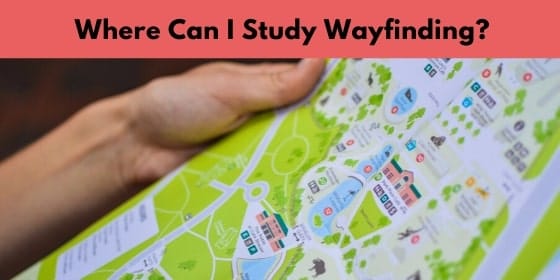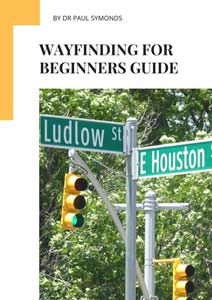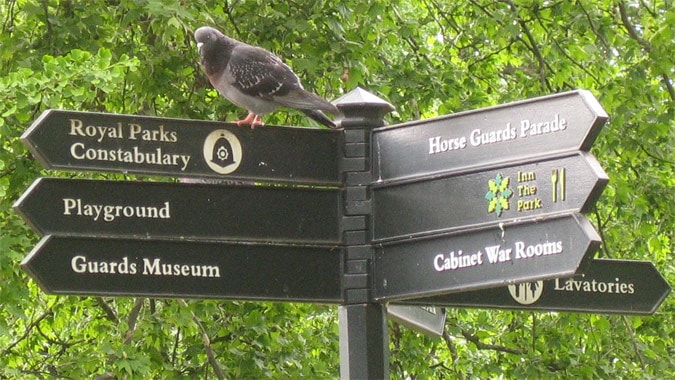Last Updated on October 14, 2023
There are a number of opportunities for getting wayfinding training and to study wayfinding. Below are the best options.

Wayfinding and Navigation are quite specialized subject areas and tend to be studied and covered within various other disciplines within academia.
You will generally find that you will need to study this subject area as a part of a Tourism, Geography, Human Geography, City Planning, Architecture or another inter-related degree or course.
There are some places though to study this subject and some of the best options are below

Table of Contents
Study Wayfinding Online
The easiest way if you want to study directly online as a student or as a professional looking to develop your understanding of:
all courses above taught by Dr Paul Symonds of travelwayfinding.com
Teachers Training Pack
Course Outline and Objectives
The overall goal of this training program is to provide participants with a solid understanding of the wayfinding basics.
At the end of the course, participants should be able to:
- Understand what wayfinding is, its importance and how it is used in different environments.
- Appreciate design basics in accordance with wayfinding.
- Understand key requirements in wayfinding (including catering to all user types).
- Have a clear appreciation for key challenges and issues that need to be catered for in wayfinding.
- How to plan a wayfinding audit.
- How to evaluate an existing location and create a wayfinding strategy.

UK Opportunities
- Wayfinding course training materials package for teachers and trainers
Tourism and Navigation Course
Many universities across the UK though offer Tourism degrees and you can certainly then make the focus of your research wayfinding or navigation-based.
Geography departments are also a good option given the way in which city planning and architecture sometimes play a vital role in navigation. Consider for example the NYC grid system as opposed to the city design of London and the differences in navigating between streets.
There are some creative ways to get involved with this subject and the BSc undergraduate degree in Plymouth University, England, in Navigation and Maritime Science provides a typical option for studying wayfinding or navigation through a niche.
Transport Studies
Another option is to consider studying ‘Transport Studies’ a subject which can be fascinating and which tends to cover many of the same disciplines which can be important in wayfinding and navigation.
Universities such as UWE (the University of the West of England) offer courses such as an MSc in Transport Planning and opportunities to study wayfinding through a Ph.D. are also possible (more info via www1.uwe.ac.uk/).
Other universities in the UK you might want to consider include:
- Imperial College London – who also offers various transport studies courses.
- The University of Leeds – and their self-named ‘Institute for Transport Research’ with courses at undergraduate and postgraduate levels.
- Cardiff University in Wales with a master’s degree in ‘Transport and Planning‘.
Airport or Port Management
One more way into wayfinding can be to study a subject such as airport management, if you might be looking to do a thesis or undertake research in a specific travel space, such as an airport.
Several British universities offer appropriate courses including the:
- University of West London – and under and postgraduate courses in Airport Management.
- Cranfield University – is the most prestigious place to study in the UK if you wish to study airport or airline studies, their MSc in Airport Planning is a well-respected qualification.
Mobility Studies
Another term and subject area which you may not have considered yet is ideal for those of you interested in courses related to wayfinding, is to study ‘Travel and Mobility Studies’.
At the time of writing a university such as Warwick University which is based in Coventry in the Midlands.
Architecture
Passini (1992) in his book ‘Wayfinding: People, Signs, and Architecture is one of the key books in Wayfinding literature and his book is central to this subject of study from an architectural point of view.
Studying architecture with a view then specializing in wayfinding is certainly a very viable option. Various universities across the UK offer architecture courses including the University of Westminster and the University of Bath.
USA
Similar to in the UK, wayfinding-related studies tend to cross over into a range of key university subject areas including Geography, Tourism, and Architecture (i.e. as part of city planning studies).
A large number of U.S. universities consider wayfinding important enough such that they have their own wayfinding pages on their own sites, but they simultaneously do not consider it important enough to teach as its own subject.
If you are looking for a specific course for routes into doing research specific to wayfinding, the following are some good options to first consider:
- The Institute of Transportation Studies at the well-respected University of California Berkeley is one of the best choices if you can get accepted into one of their programs.
- Florida Institute of Technology and their Masters in Airport Development.
- For studying architecture in the U.S. and then specializing in wayfinding, one of the best choices, if you can get in, is Columbia School of Architecture.
Workshops (Teacher or Trainer led) & Home study – Worldwide
We are developing a number of wayfinding and wayfaring related training programs and you can visit our training page to learn more. If you have any bespoke requirements for training, please feel free to contact us.
Other Opportunities
Another field of study that incorporates wayfinding is the field of Environmental psychology. This area focuses on how we interact with the environment i.e. our surroundings.
Issues such as global warming and climate change are included in this area but equally so is the field of wayfinding.
Many universities in the UK, USA, and other countries do offer courses in Environmental psychology. A few examples include:
- The University of Surrey, UK (Masters in Environmental Psychology)
- CUNY, USA (Various options).

Dr Paul Symonds has a PhD in Wayfinding from Cardiff Metropolitan University in the UK. Paul works with the signage industry, airports and other locations providing wayfinding audits, consultancy and training.













